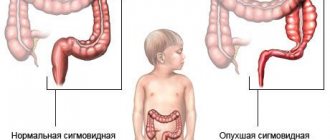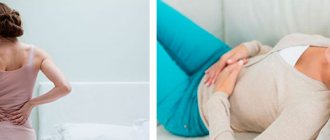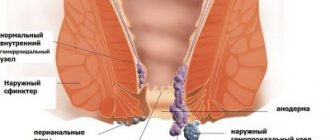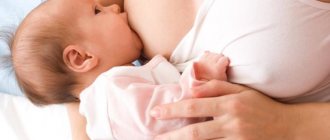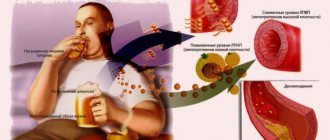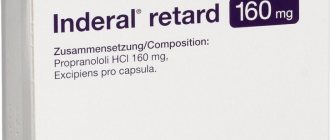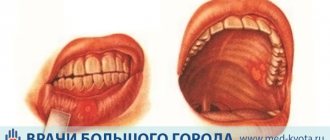Causes of constipation in women
It is usually difficult to figure out what triggered the critical condition and the inability to go to the toilet normally. The causes of constipation in women are varied. This problem can occur regardless of age, but it becomes most common in women after 40-50 years of age and in old age. Patients are in no hurry to consult a doctor for help - the disease is too delicate. However, such a decision becomes incorrect: it is better to find the root of troubles in a timely manner, before more dangerous malfunctions in the body’s functioning appear.
Causes of constipation at a young age
Stool retention in girls is a phenomenon that occurs several times more often than in men. The reasons are as follows:
- Insufficient amount of water to drink - normally you need to drink at least 1.5 liters of liquid, while teas, juices and coffee are not taken into account;
- Errors in diet and unbalanced nutrition - women are prone to frequent diets and debilitating hunger strikes in pursuit of weight loss. It is difficult for the body to survive such shocks, which leads to delays in bowel movements;
- Active consumption of strong tea and coffee - these harmless drinks have an astringent effect;
- Hormonal imbalances - constipation can occur against the background of changes in the menstrual cycle, during pregnancy and pathological phenomena in the body;
- Sedentary lifestyle - if a girl works in an office, gets to work by private car or taxi, and refuses to go for walks, processed food will stagnate in the body;
- Diseases of the digestive system - gastritis or stomach ulcers, inflammation of the colon, pancreatitis, dysbiosis, liver problems, neoplasms in the intestines, adhesions, cysts.
To determine the reason for persistent constipation in women, you need to undergo diagnostics at a medical facility. Modern equipment makes this procedure safe and painless.
What symptoms accompany constipation?
The course of treatment and the period within which you need to seek professional help depend on the symptoms.
When to go to a specialist
In addition to constipation itself, the presence of general symptoms should be a cause for concern: fever, headaches, skin rash, weakness and fatigue. This condition may indicate:
- dysbacteriosis;
- pancreatitis – a disease of the pancreas;
- pathological processes in the intestines or colon;
- neoplasms on the walls of the colon or intestines;
- dysfunction of the adrenal glands, thyroid gland or ovaries;
- diseases of the liver, stomach and other internal organs of the digestive system.
All of these diseases can significantly harm your health, so if you have common symptoms, you should immediately consult a doctor.
Fact: the same applies to cases when stool changes its consistency or color, or has admixtures of blood or pus.
When can you treat yourself?
If constipation is not caused by the above diseases and is associated only with diet, then it is accompanied by other symptoms. This is bloating, mild nausea, poor appetite, a rare urge to defecate, which either ends in vain or with changes - the feces become very hard and dry.
To get rid of the problem, you can try using folk remedies or medications presented below. However, if there is no result or your health worsens, it is better to get qualified help.
Causes of constipation in adulthood
Age-related changes in the body, of course, are not a reason for grief, but they affect the state of health, the functioning of the body, and can lead to unexpected consequences. The causes of constipation in women after 40-50 years are usually as follows:
- Hormonal disruptions in the body caused by the onset of menopause. Thus, according to statistics, at least 35% of women during menopause are forced to put up with difficulties during bowel movements;
- Prolapse of internal organs, since proper physical activity at this age is often absent;
- Restructuring the functioning of the digestive tract organs, as they begin to assimilate familiar foods in a new way;
- Deterioration of intestinal motility - serotonin is produced in insufficient quantities, which leads to disruptions in the functioning of the intestine;
- Metabolic disorders - carbohydrates and fats are absorbed better than proteins, which leads to changes in stool and their consistency. It is for this reason that women during menopause often gain excess weight;
- Diseases of the vascular system - elevated cholesterol levels contribute to blockage of blood vessels or a decrease in the lumen. As a result, the organs do not receive the required amount of oxygen from the blood, and stagnation occurs.
Otherwise, the causes of constipation are similar to those that cause the disease at a young age. The danger of this condition is due to intoxication of the body. The woman’s well-being noticeably worsens, and taking laxatives without consulting a doctor will only have a negative effect.
Features of treatment for children under 5 years of age
Constipation in young children is common. When accustomed to a common table, new food, which the digestive tract is not able to assimilate, accumulates in the intestines. When introducing a new product, mothers begin to feed the baby with a small spoon, gradually increasing the volume of adult food.
Another reason for a child may be a false feeling of hunger. Children cannot always distinguish the desire to drink from hunger, giving preference to the latter. Due to lack of moisture, the body pulls it out of soft feces, and they become a dense lump that cannot be dealt with without an enema. If adults drink little liquid, then their children are not accustomed to consuming moisture, which leads to difficult emptying.
Mechanical chronic constipation in young children is a separate line of treatment. Usually, ultrasound results during pregnancy show abnormalities in intrauterine development, and at the birth of the baby, doctors take the necessary measures to correct the disease. Constipation in such children occurs frequently, children are observed by specialists on an ongoing basis, doctors, if necessary, adjust therapy and prescribe the necessary examinations.
If chronic constipation in a child is caused by errors in nutrition and insufficient drinking, doctors recommend adjusting the diet, drinking a lot of clean drinking water, and prescribing suppositories and tablets to facilitate the process of defecation. If there is no pathology in the development of the digestive tract, such treatment to eliminate the disease in children under 5 years of age is sufficient to restore intestinal function.
Causes of constipation in old age
In general, constipation in older women occurs for the same reasons as in girls. Poor nutrition, low physical activity, and insufficient water consumption have an effect. But regular use of medications, which older women sometimes take in handfuls as prescribed by a doctor, can also provoke an unpleasant illness. Stagnant processes are sometimes observed against the background of chronic diseases:
- Diabetes mellitus;
- Depression;
- Vascular atherosclerosis;
- Parkinsonism.
The functions of the gastrointestinal tract noticeably weaken with age, intestinal motility worsens, the sensitivity of the anal sphincter decreases, and the urge to defecate becomes weaker. However, do not think that constipation in older women is the norm. This condition is pathological and requires diagnosis, identification of causes and timely treatment under the supervision of specialists.
What causes constipation?
The most common situations in which a person may become constipated are:
- Food. There are certain eating habits that can make bowel movements worse in people even without any underlying medical condition.
- — Insufficient consumption of dietary fiber (vegetables, fruits, flour, cereals)
- — Insufficient consumption of water and other liquids (soups, juices)
- - Diuretics (diuretics) or taking drugs that strengthen feces (iron, calcium, aluminum)
- — Meals with excess meat, snacks, pizza, French fries, coffee, spices, cottage cheese, rice, alcohol
- Slow activity of the intestinal muscles, slowing the passage of feces through the intestines
- – Neurological diseases (multiple sclerosis, stroke, Parkinson’s disease, brain tumors or columnar)
- — Decreased potassium in the blood
- — Sphincter injuries (enemas, sex, hemorrhoids, fistulas, infection)
- — Medicines (antidepressants, codeine, loperamide, analgesics, anticholinergics, antihypertensives, calcium channel blockers, anti-inflammatory drugs, barium, sucralfate, iron, cholestyramine, clonidine)
- — Various causes of severe illness
- - Internal blockage of the colon with feces
- — Metabolic diseases — diabetes mellitus, uremia, hypocalcemia, amyloidosis, acute porphyria
- — Endocrine diseases (hypothyroidism, pheochromocytoma)
- - Passive lifestyle
- Psychosomatic constipation (“nervous system”)
Functional constipation due to lack of adaptation to a new environment (vacation, hospital, new job, etc.)
- Bowel irritation
- Constipation in former smokers
- After abdominal or gynecological surgery
- Severe dehydration
Why is constipation dangerous for women?
The absence of normal bowel movements in itself does not pose a danger - it simply causes inconvenience and pain. But the consequences of constipation in women are unpredictable; with chronic pathology, serious complications can arise:
- Anal fissures, hemorrhoids, bleeding, resulting in anemia;
- Weakening of the muscles in the rectal area, resulting in fecal incontinence and involuntary bowel movements;
- If excessive attempts are made, the rectum may prolapse through the anus; treatment is carried out only surgically;
- The occurrence of neoplasms, since the intestines are constantly in an irritated state. Constipation is a precursor to the development of malignant tumors;
- Intoxication of the body, as toxic substances from the rectum enter the circulatory system and spread to all organs and tissues. The state of health noticeably worsens, colds become more frequent, and immunity decreases.
The danger is not only constipation itself, but also its “treatment” with laxatives. Regular use of such drugs leads to sad consequences - the intestines get used to it, stop functioning normally, and nutrients are not absorbed. Defecation without stimulation becomes impossible.
Diagnostics
At the initial appointment, you need to inform the doctor about the frequency and nature of stool, discomfort in the abdomen, and indigestion. After a general examination, palpation and percussion, additional diagnostics may be required. It is necessary to exclude a primary disease.
According to indications, the following examinations are prescribed:
- blood tests (general analysis, liver tests, amylase, thyroid hormones, etc.);
- stool analysis (coprogram);
- ultrasound examination of the abdominal organs;
- colonoscopy.
The last research method, colonoscopy, is especially important if bowel movements are accompanied by pain in the rectum or bleeding. During an examination with a fibrocolonoscope, the doctor can diagnose polyps, fissures, erosions or neoplasms of the large intestine and, if necessary, perform a biopsy.
Drugs
In women, treatment often comes down to adjusting hormonal levels - by eliminating the cause, you can completely forget about constipation. However, effective medications can also be prescribed:
- "Microlax" - breaks down feces, promotes its rapid excretion, used as single enemas;
- "Senade" are tablets that act 10 hours after administration. They are absorbed directly from the colon and are not suitable for regular use;
- "RectActive" - the effect is noticeable after 15 minutes. Suppositories for rectal use affect the body due to glyceride and escin in the composition. Contraindicated for hemorrhoids;
- Probiotics have a cumulative therapeutic effect, the result is visible several weeks after administration. The drugs improve the condition of the digestive system as a whole and have a mild effect.
Doctors also prescribe other laxatives for women. For example, “Linex”, “Lactulose”, “Duphalac”, “Linolact”, “Bisacodyl”, “Defenorm”, “Picolax”.
Treatment with mineral waters
For patients with constipation, mineral waters are recommended: “Essentuki” No. 17 and No. 4, “Batalinskaya”, “Slavyanovskaya”, “Jermuk”.
Mineral water "Essentuki" No. 17 is prescribed for constipation with hypomotility (tendency to spasms), and less mineralized water "Essentuki" No. 4 is prescribed for constipation with hypermotility of the colon.
Prescribe 1 glass of cold mineral water 2-3 times a day 1-1.5 hours before meals for several weeks. For constipation with hypermotor dyskinesia, warm mineral water is preferable.
Folk remedies
Constipation in women, regardless of age, can be treated not only with pharmaceutical drugs, but also with traditional medicine. Fast and effective medications are:
- Senna grass;
- Plantain;
- Dill;
- Tansy;
- Linen;
- Fennel;
- Caraway.
Decoctions and infusions are prepared with herbs. A spoonful of dried leaves or seeds is poured into a glass of boiling water, infused for half an hour, taken before meals or at night when going to bed. Various oils are popular: sunflower, olive, flaxseed, castor. They have a mild laxative effect, envelop the intestines, and increase the flow of bile. The oil is taken on an empty stomach before meals, washed down with water and a small amount of lemon juice.
Medical nutrition
For constipation, therapeutic nutrition is recommended as part of diet No. 3.
Energy value and composition: proteins - 100 g, fats - 100 g, carbohydrates 400-450 g, table salt 8-10 g, free liquid - 1.5 l, diet weight - 2.5-3 kg (depending on the patient’s weight), energy value: 2900–3000 kcal.
List of recommended dishes:
Bread and bakery products: wheat bread made from wholemeal flour or with the addition of wheat bran, yesterday's bread; in the absence of contraindications and good tolerance, black bread is more appropriate; dry cookies, unsweetened ones, better with added bran; crackers (preferably rye).
Soups: with weak low-fat meat, fish broth, vegetable broth; borscht, beetroot pancakes made from prefabricated vegetables, with pearl barley, buckwheat, cauliflower.
Meat dishes: lean meat (beef, veal, chicken, rabbit, turkey), boiled, baked, mostly in pieces.
Fish dishes: lean fish (pike perch, bream, cod, carp, pike, hake) boiled or aspic; if well tolerated - a little soaked herring.
Vegetable dishes and side dishes: a variety of raw and cooked vegetables as side dishes and salads. Especially recommended are beets, carrots, tomatoes, lettuce, zucchini, pumpkin, cauliflower, white cabbage and green peas, which can be boiled if tolerated well. Vegetables rich in essential oils are excluded: turnips, radishes, onions, garlic, radishes; mushrooms.
Dishes and side dishes from cereals and pasta are allowed in limited quantities; crumbly porridges made from buckwheat, barley, and millet cereals are consumed.
Egg dishes: 1-2 eggs per day (soft-boiled, in the form of an omelet or in dishes according to culinary indications) Hard-boiled eggs contribute to the development of constipation!
Sweet dishes, fruits, berries: fresh, ripe, sweet fruits and berries in raw form and in increased quantities in dishes, as well as in the form of juices.
Dried fruits and berries soaked in various dishes are especially recommended: prunes, dried apricots, apricots, and figs.
Apple and grape juices are not recommended; plum juice is beneficial. Plums contain organic acids that promote bowel movements, so prunes in any form are highly recommended.
It is recommended to consume an infusion of 24 prunes daily, 12 fruits and ½ cup, infusion 2 times a day.
Marmalade, marshmallows, marshmallows, toffee, milk and cream caramels, preserves, jams, jams, sweet fruits, berries, sugar, honey are allowed.
Dairy products: one-day kefir (fresh), acidophilus, yogurt, fermented baked milk, fresh non-acidic cottage cheese (in its natural form, in the form of baked puddings, cheesecakes, lazy dumplings) are recommended. Milk is well tolerated in dishes and tea. Non-acidic sour cream as a seasoning for dishes in small quantities. The cheese is mild.
Sauces and spices: parsley, dill, cilantro, celery, bay leaf, cinnamon, cloves. Fruit sauces, white sauce with a little sour cream.
Appetizers: mild cheese, black caviar, ham without lard, veal, chicken, jellied fish, soaked herring, vegetable and fruit salads. Seaweed is very healthy and effective.
Drinks: weak tea, rose hip decoction, weak surrogate coffee, sweet fruit juices (plum, apricot), vegetable juices (tomato, carrot, etc.).
Fats: butter, olive oil (add to prepared dishes, serve in their natural form). Sunflower and other vegetable oils are allowed if well tolerated. Refractory animal fats are excluded: pork, beef, lamb lard, shortening.
In the absence of contraindications, it is advisable to recommend a “diet with greens”, including 100 g of raw vegetable salad three times a day before meals.
When compiling a daily diet, it is necessary to ensure that the diet contains at least 25–30 g of dietary fiber per day. Dietary fiber stimulates intestinal motility and promotes bowel movement.
We present the content of dietary fiber in grams per 100 g of product in various food products (A. A. Pokrovsky, 1992).
- Oranges - 1.4
- Carrot - 1.2
- Cherry – 0.5
- Wheat bran – 8.2
- Canned peas – 1.1
- Peaches (pulp and peel) – 0.9
- Dried mushrooms – 19.8
- Parsley - 1.5
- Pears - 0.6
- Raw rhubarb – 1.0
- White cabbage – 1.0
- Turnip - 1.4
- Sauerkraut – 1.0
- Plums - 0.5
- Cauliflower – 0.9
- Fresh tomatoes – 0.8
- Potatoes – 1.0
- Protein-bran bread – 2.1
- Strawberry - 4.0
- Cereal bread – 1.3
- Buckwheat – 1.1
- Rye bread – 1.1
- Gooseberry – 2.0
- Prunes – 1.6
- Dried apricots - 3.2
- Apples - 0.6
- Green onion – 0.9
- Dried apples – 5.0
- Raspberry - 5.0
Physiological effects of dietary fiber: increased satiety, suppressed appetite, decreased hypercholesterolemia, choleretic effect; an increase in the mass of feces, dilution of intestinal contents, acceleration of intestinal passage.
It is advisable to include bran in the diet of a patient suffering from constipation, which promotes bowel movements.
M. Kh. Levitan (1981), E. A. Beyul (1983) recommends using them as follows:
“Pour boiling water over the wheat bran (so that it swells and becomes softer), then drain the supernatant liquid. Swollen bran (can be added to compotes, jelly, soups) in the first 2 weeks is prescribed 1 teaspoon 3 times a day, then increase the dose to 1-2 tablespoons 3 times a day; after achieving a laxative effect, the dose is reduced to 1/5–2 teaspoons 3 times a day. Treatment continues for at least 6 weeks.”
Prevention and diet
Preventing constipation is much easier than treating it. Methods of prevention and proper nutrition are also effective if a woman has a tendency to stool stagnation. Laxatives will only give a short-term effect, but for preventive purposes it is recommended:
- Increase the volume of water - drink it during meals and before meals;
- Eat in small portions, but more often - every 3-4 hours;
- Balance the diet, add fermented milk products, vegetable soups, seaweed and dried apricots;
- You need to eat more vegetables, fruits and berries, they will improve the condition of the intestines and relieve constipation;
- You will have to give up black tea, large quantities of coffee, carbonated drinks and fresh milk. It is also worth limiting the consumption of sugar, smoked, fried foods and baked goods;
- You cannot have lunch in front of the TV screen or on the run - eat in a calm, measured atmosphere, chewing thoroughly;
- Dedicate at least a little time to physical activity - a half-hour walk in the fresh air will benefit not only the intestines, but the entire body.
Drinking vegetable juice on an empty stomach in the morning or eating an apple will help prevent constipation. Boiled beets and pumpkin should become your favorite foods along with kefir.
The reasons for fecal stagnation in women are varied. Only a doctor can determine exactly what the provoking factor was, and you should contact him without fear. It will not be possible to get rid of a delicate problem only with the help of laxatives - complex treatment, nutritional adjustments, and elimination of concomitant pathologies are required.
Treatment of chronic constipation
When chronic constipation is diagnosed, treatment is prescribed in different directions. If previously only laxatives were used, today the problem is approached in a comprehensive manner. Traditional medicine offers many measures that can prevent and treat constipation.
Treatment methods for constipation
In medicine, there are multidirectional treatment methods to get rid of chronic constipation
only possible if the cause is eliminated.
Treatment methods include:
- drug treatment;
- prescribing a special diet;
- acupuncture;
- herbal medicine;
- physiotherapy and reflexology.
The use of one or more measures in combination helps to cope with difficult bowel movements, focusing on the degree of its manifestation. Traditional medicine still focuses on drugs for chronic constipation
. They have an immediate, but often one-time effect, so it is better to radically change your lifestyle.
Popular medications for constipation
Laxative for chronic constipation
can often cause big problems due to addiction to medications in this group. According to statistics, after five years, half of the patients taking laxatives stop responding to them; after ten, only 10% report a positive effect. When choosing this method, you should adhere to a number of recommendations:
- take only one type of drug;
- follow the prescribed course;
- If the effect decreases, consult a doctor.
Drugs that speed up and facilitate bowel movements are divided into two types. The first promote the contents in the intestines. They are based on picosulfate, bisacodyl, anthraquinones, and include rhubarb and buckthorn. The second group of medications enriches the intestines with water, making the stool less dense. They contain salts, often macrogol or lactulose are used as the active substance.
Recipes, menus and diet products
Diet for chronic constipation
It is the diet that greatly influences the stool, so an excellent remedy for chronic constipation is proper nutrition. The diet is based on eating foods rich in dietary fiber. People suffering from constipation or susceptible to illness should eat fruits and vegetables daily. Natural products are rich in fluid, vitamins and phytonutrients that speed up bowel function.
Emphasis should also be placed on black bread, fermented milk products, buckwheat, oatmeal or barley cereals, and pickles. All these products will have a beneficial effect on the process of defecation if it becomes difficult.
Separately, drinking plenty and often should be emphasized. When chronic constipation is diagnosed and how to treat it
The doctor decides to make it as effective as possible, but among the advice there is always an emphasis on drinks. It is recommended to drink more lemonade, juices, and mineral water. Kvass and beer help relieve constipation, but you should not abuse alcoholic beverages. Drinking should be included immediately after sleep and before it, as well as before meals. It is better to avoid black tea and coffee due to the high caffeine content. Lemon juice is considered a natural laxative, so it is recommended to add it to drinks.
The use of natural laxatives for constipation is recommended not only by traditional medicine. Patients should eat pumpkin, bee products, and spinach. Drinks made from flax seed, carrot, nettle or dandelion can also help treat constipation.
Chronic constipation: treatment by activating muscle function
chronic constipation develops due to weak functioning of the intestinal muscles
during treatment? There are various recommendations of integral medicine that are used independently or during procedures. For example, an active lifestyle will have a positive effect on the functioning of the intestinal muscles.
Modern medicine resorts to the use of additional procedures that give a boost to the intestines, including physiotherapy and reflexology. With an integrated approach, they have a positive effect on the dynamics of treatment.
If previously chronic constipation was treated only with laxatives, today doctors recommend eliminating the cause and helping the intestines work with loyal methods. The maximum effect is achieved by changing lifestyle, following a diet and taking a course of preventive procedures that strengthen muscles and speed up bowel function.
